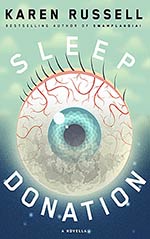
![]() FeminineFantastique
FeminineFantastique
5/23/2014
![]()
Karen Russell's 2014 novella Sleep Donation takes place in a near-future in which insomnia has become an epidemic. A deadly epidemic. For unlike what we think of normally as insomnia — an intermittent inability to fall or stay asleep — this insomnia is permanent. In the end, it renders its victims unable to sleep at all for however much longer their bodies last before they commit suicide, starve to death, or their internal organs shut down.
The protagonist Trish Edgewood's sister was one of the first to die — after three weeks without sleep, followed by convulsing and with the loss of any idea who she was and finally with organ failure. This spurred Edgewood to join the non-profit Slumber Corp as a recruiter for donators, since scientists have found a method for normal sleepers to donate sleep to the sufferers. But demand far outstrips supply, and complicating the plot is that not all of the insomniacs can receive all donations, just like is the case with blood types. Additionally, nightmares render the donated sleep useless at best and dangerous at worst. And because only cognizant brains are capable of rendering horror, of true nightmares…
This makes the ideal donors babies.
Trish happens to stumble across Baby A — a universal donor, the hypothetical O-negative. After she convinces the parents of the dire need for their child's sleep, Baby A becomes a regular donor. To subject her to the procedure so frequently is not without risk.
And this is the first of several ethical dilemmas faced by the protagonist. As the epidemic grows worse and worse, and as the world (in addition to Trish) finds more reasons to distrust Slumber Corp, she must navigate a crisis of conscience that has the potential to change the world forever.
Sleep Donation is unquestionably literary fiction — not all plot threads are tied in neat bows; there's a certain amount of ambiguity in the story; it is unquestionably a book that will leave you thinking long after. In fact, because Russell is pegged as a literary fiction writer, it's rare to hear her name in genre conversations. But this novella is also certainly science fiction, and I also read it in one sitting and thus forgot to eat lunch. (Oh, and I couldn't be bothered to take notes for this review as I was reading it, because that would have required putting it down. So I'm winging it here.)
I can't think of any books with similar voices or styles to Russell's, but I can think of a couple with similar themes, worlds, and plot elements. So while their writing voices are quite different, anyone else who's getting crabby about the wait for the releases of John Scalzi's Lock In and the companion novella Unlocked should definitely give this book a shot in the meantime.
http://manicpixiedreamworlds.wordpress.com/